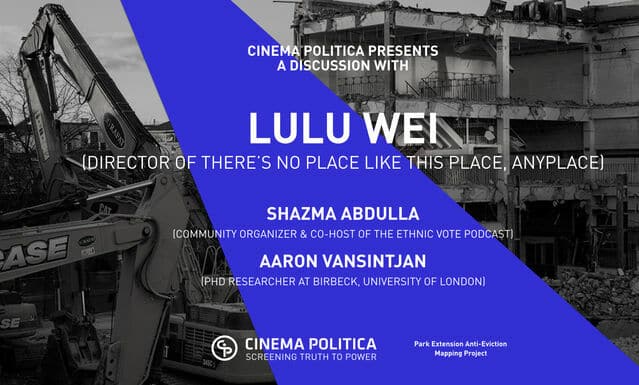On Monday November 23, Cinema Politica Concordia hosted a discussion on gentrification and displacement, urban redevelopment, and affordable housing with Lulu Wei, the director of the recently premiered THERE’S NO PLACE LIKE THIS PLACE, ANYPLACE. Joining Lulu Wei were community organizer and podcaster Shazma Abdualla, and PhD researcher from Birbeck, University of London, Aaron Vansintjan.
This discussion was co-presented with Anti-Eviction Montreal / Anti-éviction Montréal.
THERE’S NO PLACE LIKE THIS PLACE, ANYPLACE looks at the transformation of a much-loved Toronto landmark, the Honest Ed’s and Mirvish Village block, through the stories of its community members who are forced to relocate when it is sold to Vancouver-based developer Westbank Corp. While the film focuses on one neighbourhood in Toronto, it is widely relevant to major cities across Canada. Here in Montreal, the film resonates with the anti-gentrification movement in Parc-Ex, Milton Park and Pointe-St-Charles, and as we head into the second winter with COVID-19, this crisis may only be starting, however, as evidenced by swelling unemployment, the gradual collapse of the service industry, and many workers left without paid sick days. Meanwhile, temporary housing and tent cities in Toronto and Montreal continue to be dismantled.
Director Lulu Wei reflected on how her personal experience with eviction helped shaped the story of THERE’S NO PLACE LIKE THIS PLACE, ANYPLACE. Through this intimate lens, Wei also shines a refreshing light of normalcy on depictions of queer relationships in film, break the cliché mold of coming-of-age stories.
As a resident of the Mirvish Village block, Wei connected with local artists and business-owners like painter and gallery-owner Gabor Mezei, and owner of A Different Booklist, Itah Sadu, whose stories represent creative reinvention and resilience in spite of adversity. The audience witnesses an inspiring victory as the city eventually buys back Wei’s old building from developers, destined to become a new home for the bookstore and Black and Caribbean community centre that Sadu has carefulyl nurtured. A Different Booklist holds space within a legacy of Black community at Bloor & Bathurst, which thrived alongside Honest Ed’s – from the historic Contrast newspaper to the barbershops and restaurants that thrived on the block.

Still from THERE’S NO PLACE LIKE THIS PLACE, ANYPLACE 


Still from There’s No Place Like This Place, Anyplace
Shazma Abdulla, co-host of the podcast The Ethnic Vote, spoke about the significance of the Honest Ed’s block for queer, BIPOC and working class communities in Toronto – communities that are often treated as disposable and unwelcome. Emphasizing the historically low, crisis-level vacancy rates in Montreal, as well as increasing gentrification in Ottawa, Abdulla discussed the unrealistic framing of “affordability”, where it is based on a city’s median income as opposed to the percentage of actual income earned. These rates are used to allocate a certain percentage of new units as “affordable” housing, when in reality they don’t even come close to being accessible to working class incomes.
PhD researcher with Birbeck, University of London, Aaron Vansintjan spoke about the parallel between gentrification in Montreal and Hanoi, Vietnam. Referring also the normalized social and co-operative housing model in Vienna, Vansintjan emphasized that housing would never be affordable so long as it’s a mode of profit, and that the focus should be on getting housing out of the hands of the market. Reflecting on the privatization of housing councils in London, he described how real estate speculation is shaped by the profit that could be extracted from a neighbourhood, which is often inferred from artist communities.
While community consultations are usually attended by home-owners, and the demographic skews white or older, organizers should participate in these consultations as they ultimately determine the shape of communities. Other strategies include raising awareness and putting pressure on developers by working with the media, and supporting existing tenant advocacy organizations through funding or volunteering.
Watch the Q&A above, or click here to view.




